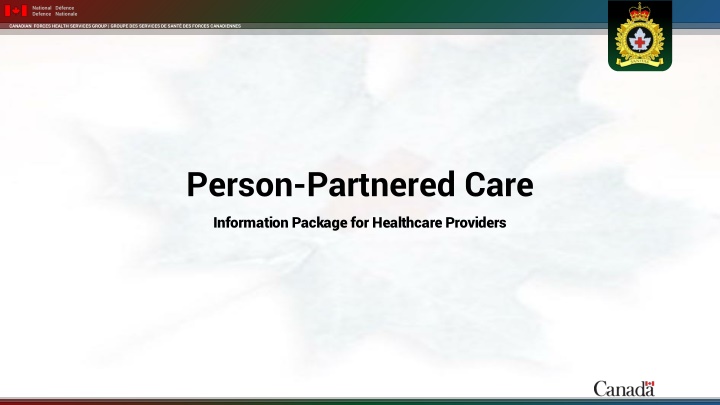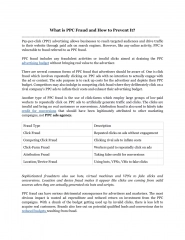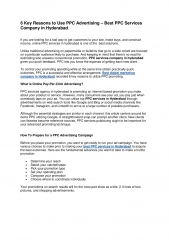
Canadian Forces Health Services: Promoting Person-Partnered Care and Effective Communication
Empowering healthcare providers within the Canadian Forces Health Services Group to deliver person-partnered care, emphasizing accountability, responsiveness, and respect. Learn about the importance for clinics, core principles, healthcare provider roles, and effective communication techniques.
Download Presentation

Please find below an Image/Link to download the presentation.
The content on the website is provided AS IS for your information and personal use only. It may not be sold, licensed, or shared on other websites without obtaining consent from the author. If you encounter any issues during the download, it is possible that the publisher has removed the file from their server.
You are allowed to download the files provided on this website for personal or commercial use, subject to the condition that they are used lawfully. All files are the property of their respective owners.
The content on the website is provided AS IS for your information and personal use only. It may not be sold, licensed, or shared on other websites without obtaining consent from the author.
E N D
Presentation Transcript
National Defence D fence Nationale CANADIAN FORCES HEALTH SERVICES GROUP | GROUPE DES SERVICES DE SANT DES FORCES CANADIENNES Person-Partnered Care Information Package for Healthcare Providers
National Defence D fence Nationale CANADIAN FORCES HEALTH SERVICES GROUP | GROUPE DES SERVICES DE SANT DES FORCES CANADIENNES Introduction THE SHIFT TO PERSON-PARTNERED CARE - Evolving healthcare paradigms - Prioritizing the voice of service members and their families/designated care partners - Integrating care with respect and understanding
National Defence D fence Nationale CANADIAN FORCES HEALTH SERVICES GROUP | GROUPE DES SERVICES DE SANT DES FORCES CANADIENNES Importance for Clinics WHY IS THIS CRITICAL FOR BASE CLINICS? - To improve patient satisfaction and outcomes - Address unique challenges of military life and healthcare - Promote a culture of understanding, trust, and collaboration
National Defence D fence Nationale CANADIAN FORCES HEALTH SERVICES GROUP | GROUPE DES SERVICES DE SANT DES FORCES CANADIENNES Core Principles Accountability Responsiveness Respect and Dignity Belonging Participation and Collaboration Openness and Information Sharing
National Defence D fence Nationale CANADIAN FORCES HEALTH SERVICES GROUP | GROUPE DES SERVICES DE SANT DES FORCES CANADIENNES Role of Healthcare Providers Engaging in active listening and open dialogue Building rapport and trust Offering resources and education tailored to individual needs Coordinating seamless care experiences
CANADIAN FORCES HEALTH SERVICES GROUP | GROUPE DES SERVICES DE SANT DES FORCES CANADIENNES Effective Communication Techniques Active listening skills Asking open-ended questions Providing clear and comprehensible information, avoiding medical jargon Addressing potential barriers to communication Recognizing non-verbal cues
National Defence D fence Nationale CANADIAN FORCES HEALTH SERVICES GROUP | GROUPE DES SERVICES DE SANT DES FORCES CANADIENNES Engaging Family & Designated Care Partners Recognizing the importance of family in care decisions Facilitating family consultations 1 2 Collaborating with base MFRCs & CFMWS for support services Address concerns and needs of family/designated care partners 3
National Defence D fence Nationale CANADIAN FORCES HEALTH SERVICES GROUP | GROUPE DES SERVICES DE SANT DES FORCES CANADIENNES Mapping Patient Journey Walk through the patient s journey from their perspective Identify touchpoints and opportunities for improved partnership Collaboratively develop strategies for enhancing the patient experience
National Defence D fence Nationale CANADIAN FORCES HEALTH SERVICES GROUP | GROUPE DES SERVICES DE SANT DES FORCES CANADIENNES Continuous Learning and Feedback Members and their families are crucial partners in the care journey. Their input, feedback, and collaboration are essential for optimal outcomes Effective communication is the cornerstone of the PPC model Regularly putting oneself in the patient's shoes can lead to a better understanding and enhanced care experiences






















